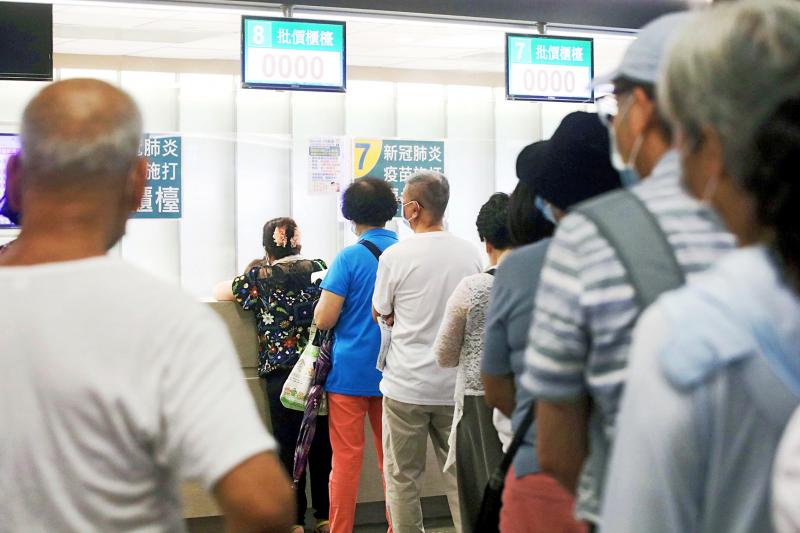The central government alone is in charge of importing and approving the use of COVID-19 vaccines, Minister of Health and Welfare Chen Shih-chung (陳時中) yesterday told a media briefing in Taipei, responding to calls for the involvement of local governments in Taiwan’s vaccine drive.
Taipei Mayor Ko Wen-je (柯文哲) had said that Chen, who heads the Central Epidemic Command Center (CECC), concealed that local government officials could import vaccines doses through pharmaceutical companies.
Chen said that those companies must apply for licenses to import drugs with the Food and Drug Administration, which can allow imports of drugs pending approval.

Photo: Cheng I-Hwa, Bloomberg
“Drug imports must be based on the Pharmaceutical Affairs Act [藥事法], which allows emergency import if the drug has yet to secure relevant certificates. Local governments are not pharmaceutical companies, and they cannot import drugs,” he said.
Vaccine procurements are a national security issue, Chen said, adding that the import, production and use of vaccines is regulated by the central government.
This was to avoid confusion and chaos, he said, adding that countries around the world have similar rules in place.
As of yesterday, 129,669 people in Taiwan have received at least one dose of a COVID-19 vaccine produced by AstraZeneca, CECC data showed.
On Tuesday, 16,180 people received the jab, a new record for vaccination on a single day, it showed.
Centers for Disease Control (CDC) Deputy Director-General Chuang Jen-hsiang (莊人祥), who is CECC spokesperson, said that two women, who are in their 40s, had severe side effects after being vaccinated.
One of them reported a swollen left cheek and pain in the left upper arm, while the other experienced visual impairment, Chuang said.
“So far, there has yet to be studies on the correlation of the AstraZeneca vaccine and visual impairments,” Chuang said, adding that the center would examine the reports.
Meanwhile, Chen also dismissed the possibility of launching universal testing, despite a surge of locally transmitted cases.
“To contain the spread of the virus, contact tracing and testing should be conducted quickly. Those who are potentially infected might be in the incubation period or already infectious, and we want to quickly stop the virus from spreading,” he said. “Universal testing without specific purpose would only weaken our ability to contain the outbreak.”
In related news, National Security Bureau (NSB) special forces personnel responsible for protecting President Tsai Ing-wen (蔡英文) and Vice President William Lai (賴清德) have started receiving vaccines, a source in the military said on condition of anonymity, adding that all personnel would be fully vaccinated by the end of this month.
NSB Director-General Chen Ming-tong (陳明通) would receive a shot soon, the source said.
Additional reporting by CNA

Taiwanese actress Barbie Hsu (徐熙媛) has died of pneumonia at the age of 48 while on a trip to Japan, where she contracted influenza during the Lunar New Year holiday, her sister confirmed today through an agent. "Our whole family came to Japan for a trip, and my dearest and most kindhearted sister Barbie Hsu died of influenza-induced pneumonia and unfortunately left us," Hsu's sister and talk show hostess Dee Hsu (徐熙娣) said. "I was grateful to be her sister in this life and that we got to care for and spend time with each other. I will always be grateful to

UNITED: The premier said Trump’s tariff comments provided a great opportunity for the private and public sectors to come together to maintain the nation’s chip advantage The government is considering ways to assist the nation’s semiconductor industry or hosting collaborative projects with the private sector after US President Donald Trump threatened to impose a 100 percent tariff on chips exported to the US, Premier Cho Jung-tai (卓榮泰) said yesterday. Trump on Monday told Republican members of the US Congress about plans to impose sweeping tariffs on semiconductors, steel, aluminum, copper and pharmaceuticals “in the very near future.” “It’s time for the United States to return to the system that made us richer and more powerful than ever before,” Trump said at the Republican Issues Conference in Miami, Florida. “They

REMINDER: Of the 6.78 million doses of flu vaccine Taiwan purchased for this flu season, about 200,000 are still available, an official said, following Big S’ death As news broke of the death of Taiwanese actress and singer Barbie Hsu (徐熙媛), also known as Big S (大S), from severe flu complications, the Centers for Disease Control (CDC) and doctors yesterday urged people at high risk to get vaccinated and be alert to signs of severe illness. Hsu’s family yesterday confirmed that the actress died on a family holiday in Japan due to pneumonia during the Lunar New Year holiday. CDC Deputy Director-General Tseng Shu-hui (曾淑慧) told an impromptu news conference that hospital visits for flu-like illnesses from Jan. 19 to Jan. 25 reached 162,352 — the highest

TAIWAN DEFENSE: The initiative would involve integrating various systems in a fast-paced manner through the use of common software to obstruct a Chinese invasion The first tranche of the US Navy’s “Replicator” initiative aimed at obstructing a Chinese invasion of Taiwan would be ready by August, a US Naval Institute (USNI) News report on Tuesday said. The initiative is part of a larger defense strategy for Taiwan, and would involve launching thousands of uncrewed submarines, surface vessels and aerial vehicles around Taiwan to buy the nation and its partners time to assemble a response. The plan was first made public by the Washington Post in June last year, when it cited comments by US Indo-Pacific Commander Admiral Samuel Paparo on the sidelines of the Shangri-La Dialogue